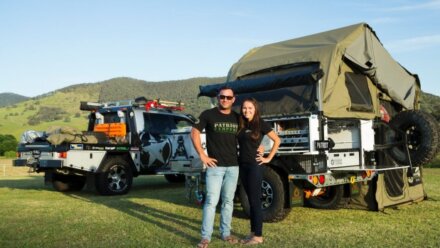
Third Generation Manufacturing Shows Australia Still in the Game
While scores of large companies have moved their manufacturing operations offshore in the quest for lower costs and higher shareholder returns, savvy family-run enterprises are finding that “Made in Australia” can still make financial and business sense.
It does for Queensland-based Patriot Campers, which expects to see its four hundredth camper trailer roll off the assembly line by year’s end.
The company was founded two years ago by Brisbane entrepreneur Justin Montesalvo, after a camper trailer he designed and built for himself in his spare time won a national award. Targeted at the premium end of the market, Patriot’s trailers sell for up to $59,990.
Initial fabrication is carried out at Express Metal Products, Montesalvo’s sheet metal plant in Brisbane, followed by assembly at Patriot’s own factory on the Gold Coast.
The latter facility employs 34 staff, many of whom have automotive trades backgrounds. It can turn out a trailer every 10 hours.
Montesalvo is preparing to settle on a neighbouring facility and expects to double Patriot’s production capacity and cut assembly time to four hours within the next year, as the firm gears up for an assault on the US market.
Yes, production costs could be slashed by 40 per cent if he manufactured in China or another low cost location but that’s not what the venture stands for, Montesalvo says.
“Obviously from a costing perspective, if we’d wanted to go into the market at a price point we wouldn’t have a hope of manufacturing in Australia but that’s not what Patriot Campers has been about,” he says.
“I’m a third generation manufacturer … my grandfather came out here [from Italy], he’s always been in manufacturing … now I’m in manufacturing.
“Our customers are definitely prepared to pay the premium for the quality that we produce… I’ve spent a lot of time in America, looking at manufacturing facilities there, we’ve just been through a whole exercise, costings wise, into producing in Mexico to service the US market but we’ve canned that, we’ve decided that we want to keep it Australian made.”
While the days of local factories employing hundreds of bodies are gone, those that focus on automation can still do well locally, Montesalvo believes.
“Our labour content is what really hurts Australian manufacturing – the price of materials and processing costs are the same anywhere in the world,” he says.
“The more technology that we can introduce into our business … driving a process of automation, making the processes as minimal hands-on as possible, that’s really the key to manufacturing, in my opinion.”
Besides high wages, the capital cost of starting a factory from scratch can be a major impediment for small and medium enterprises pondering local production, according to Jana Matthews, the ANZ Chair in business growth at the University of South Australia.
“[There’s] land, factory, software, hardware … all of which, if you’re doing it yourself, you have to fund, purchase, install … before you ever have anything come out the other end which is revenue related,” Matthews says.
“Whereas if you contract manufacture it somewhere else, that’s their problem, it’s not appearing on your balance sheet.
“On the other hand, once you’ve made that investment, then you can ramp up production and go one, two, three shifts and amortise that equipment and so you drag down the cost per unit.”
Manufacturing locally can also offer major brand advantage and make it quicker and simpler to tweak products and the production process, Matthews adds.
For family-owned paint manufacturer Haymes, not having to deliver unsustainable returns has been the key to surviving and thriving locally.
Founded in 1935, Haymes employs 200 staff, 37 of them in its Ballarat factory, which churns out 15 million litres of paint annually.
National sales manager Matthew Haymes says not having to “chop out costs to return it back to shareholders” has enabled the firm to produce quality products and remain competitive without shifting production offshore.
“When you’re a family business you don’t have that,” Haymes says.
“You’ve still got a responsibility not to go broke … but you don’t have these outrageous expectations that for every dollar of revenue I make 20 cents of profit, that’s not our expectation at all.
“There’s stakeholders and shareholders in the business and they don’t expect to make massive returns every year. It’s about the pride of keeping a family business going in Australia and employing 200 families.
“Going offshore is in defiance of the culture they’ve created. It was never a consideration. You’ve just got to be smarter in the way you do things but also have realistic expectations.”